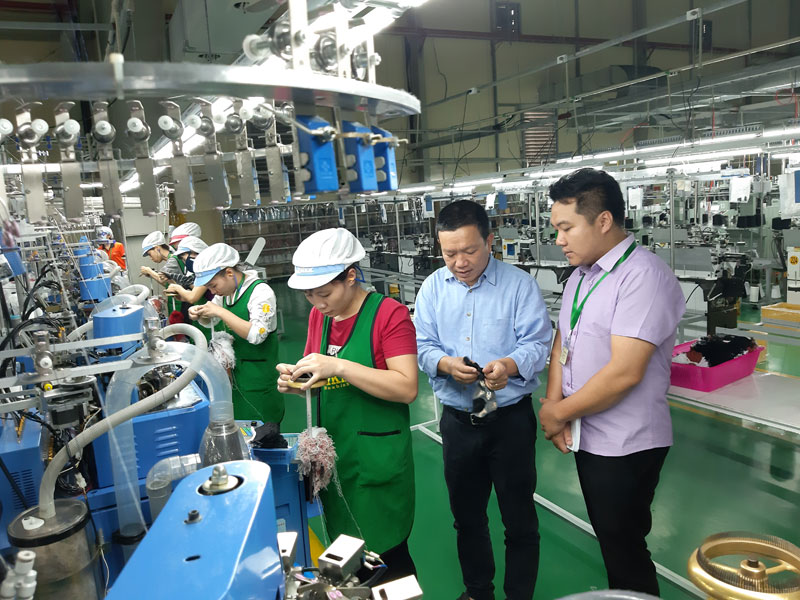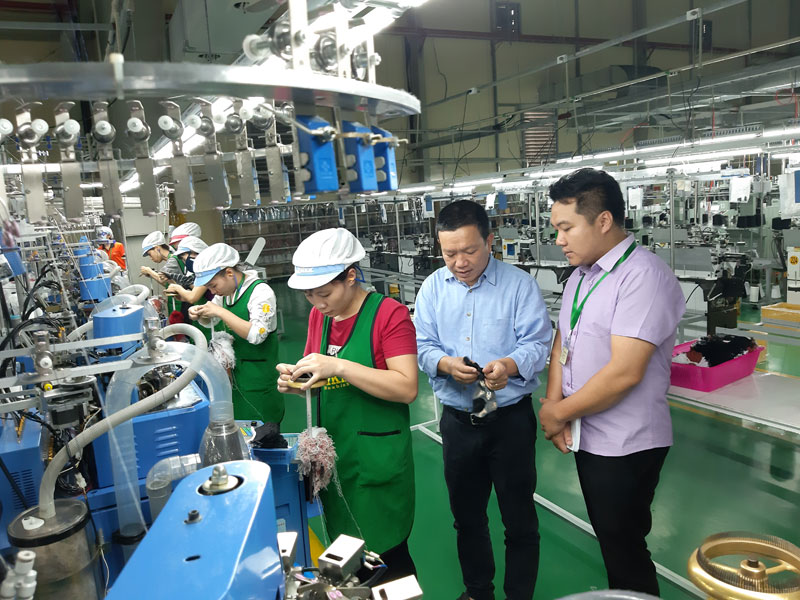
(HBO)- Immediately after the Lunar New Year holiday, the year of Pig, most of the enterprises in the industrial zones in the province have started to implement their production and business plans with the exciting and urgent atmosphere, promising the new year with great expectations of economic development and social security in the province.

After the Lunar New Year, Hoa Binh Koyuseni
Knitting Co., Ltd. at the left-side
industrial park of Da river's has returned to stable operation, creating jobs
for more than 400 local workers.
According to the initial record, after Tet
holiday, many enterprises such as Sankoh Co., Ltd. R lens Co., Ltd, Vietnamese
GGS Garment Company ... (the left-side industrial zone of Da river); Vietnamese
Doosung Tech Co., Ltd., ViNa HNT Esquel, Vietnamese Nissin Manufaturing, INC
Seyong, Midori Vietnamese Apparel ... (Luong Son Industrial Park) have come
into stable operation, deploying the emulation movements to complete the
monthly and quarterly production plans of 2019.
The deputy chief of the Management Board of
the provincial Industrial Zones, Mr. Duong Nhu Re says that after Lunar New
Year, the year of Pig, workers have returned for work at the Industrial Zones
to implement the plan for 2019. Many enterprises have had orders for whole
year, promising a good year for industrial development and restructuring of the
province.
Now there are eighty-seven investment
projects, twenty-five of which have received the direct investment with a total
registered capital of US $607.63 million and 62 domestic projects with a
registered capital of over 7,172 billion VND in the provincial industrial parks. Forty-nine projects have gone into
operation and business activities. By the end of January 2019, the enterprises
have made the revenue of 45 million US dollars and 100 billion VND. The export
value has reached 43 million US dollars and 12 billion VND, paying 0.4 million
US dollars to the budget and 15 billion VND, creating jobs for 17,858 people,
90% of which are the local people.
According to data from the Hoa Binh Provincial Party Committee, the industrial production index for the first six months of 2025 is estimated to have increased by 20% compared to the same period last year. This marks the highest year-on-year growth rate for this period since 2020.
In the first six months of 2025, Hoa Binh province’s export turnover was estimated at 1.145 billion USD, marking an 18.11% increase compared to the same period in 2024. Import turnover was estimated at $ 804 million, a 17.15% increase, which helped the province maintain a positive trade balance.
The lives of the ethnic minority farmers in Tan Lac district have gradually improved thanks to the new directions in agricultural production. This is a testament to the collective strength fostered through the professional associations and groups implemented by various levels of the district’s Farmers’ Union.
With the motto the "product quality comes first,” after nearly one year of establishment and operation, Muong village’s Clean Food Agricultural and Commercial Cooperative, located in Cau Hamlet, Hung Son Commune (Kim Boi district), has launched reputable, high-quality agricultural products to the market that are well-received by consumers. The products such as Muong village’s pork sausage, salt-cured chicken, and salt-cured pork hocks have gradually carved out a place in the market and they are on the path to obtaining the OCOP certification.
In the past, the phrase "bumper harvest, rock-bottom prices" was a familiar refrain for Vietnamese farmers engaged in fragmented, small-scale agriculture. But today, a new spirit is emerging across rural areas of Hoa Binh province - one of collaboration, organisation, and collective economic models that provide a stable foundation for production.
Maintaining growing area codes and packing facility codes in accordance with regulations is a mandatory requirement for agricultural products to be eligible for export. Recently, the Department of Agriculture and Environment of Hoa Binh province has intensified technical supervision of designated farming areas and packing facilities to safeguard the "green passport" that enables its products to access international markets.



